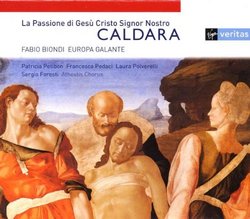Religious feelings and operatic beauty in one work.
06/17/1999
(5 out of 5 stars)
"Fabio Biondi has resurrected this wonderful work with his so peculiar sense of rhythm. Of course, the words may seem outdated and even irritate our sense of authenticity (through Bach's Passions in particular) but we should not forget that comments on Christ's sufferings were rather frequent then (description of nails going through His skin...). Here they are sung with such a sense of commitment that we forget their litterary ineffectiveness. The arias (contrary to recitatives which are bad paraphrases from the Bible) enable the artists to express their inner feelings: suffering in the first part, joy and hope in the second part. Just hearing Patricia Petitbon sing "Vorrei dirti", her voice mingled to instruments, full of regrets and pains, is a rare experience to be lived through."
More successful than Bach?
Giordano Bruno | Wherever I am, I am. | 05/13/2008
(5 out of 5 stars)
"While JS Bach struggled for a measure of support and dignity under the thumbs of petty burghers in provincial Saxony, Antonio Caldara spent 20 years in Vienna as the favorite composer of the Hapsburg Emperor Charles VI, with a lavish income and with access to the largest and best assemblage of musicians in all of Europe. In the eyes of his contempraries, he was certainly more successful than Bach. Lest you jump to conclusions about the blindness of audiences to real genius, however, you'd best listen to this CD. Caldara was no second-rater; he deserved his esteem and earned his reputation with prodigious productivity of lovely music. It's true that he wasn't Bach, but nobody else was either. Ironically, justice has been served in its usual ineffectual manner; Bach is a household name worldwide, while Caldara is largely forgotten and underperformed.
If this "Passion of Our Lord Jesus Christ" sounds like Italian Baroque opera to your ears, there are good reasons. It's sung in Italian rather than the usual Latin of passion oratorios. The singers are opera-trained and sing quite operatically, and Caldara was perhaps the most prolific composer of operas in the 18th Century. Jesus Christ is not a character in this quasi-opera; the dialogue takes place after the crucifixion, between Peter and John, Mary Magdalene, and Joseph of Arimathea, all but Joseph sung by women. Contralto Laura Polverelli is especially dramatic and passionate as Peter, who opens the drama singing of his guilt at having "denied" the Master three times. Bass Sergio Foresti - Joseph of Arimathea - sings only two solo arias, but they are the best music in the whole Passion, and one might wish to hear more of Signore Foresti.
Caldara pleased his imperial patron by writing in a denser and more intellectual polyphonic style than was fashionable at the time. Even so, he rarely approaches Bach in musical complexity; his virtues are in affect and elegance. It's told that the Emperor himself enjoyed playing the harpsichord continuo for Caldara's rehearsals. Don't bother wishing that Charles VI had known of Bach, however. Johan Sebastian was steadfastly Lutheran and Chuck was devotely Catholic. It wouldn't have worked...
Fabio Biondi and his ensemble Europa Galante are, as usual, thrillingly eccentric and yet polished to a titanium sheen. Biondi's name on the jacket of any CD of Italian Baroque music is a guarantee of the highest quality. In this performance, the instrumentalists get rather few chances to take center stage, but when they do, they shine. Patricia Petibon, the soprano who sings Maddalena, is rapidly becoming a superstar in Early Music. She has a glorious full-bodied voice. I can imagine Rossini and Donizetti fans lusting to hear her in later repertories.
The libretto for this Passion is not extracted from the Bible, but rather written by Pietro Metastasio. Recognize that name, opera fans? I have to say it's not worthy of the music and it includes an offensive tendency to blame the Jews for Jesus's suffering and to predict disasters which will befall them in punishment. You don't need to read it to enjoy the singing."


 Track Listings (32) - Disc #1
Track Listings (32) - Disc #1